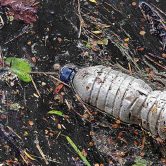
A recent Greenpeace voyage around the coastline of Scotland took place to ascertain the impact of plastic pollution off our shores. Crucially, the expedition aimed to see just how plastic waste is affecting our seabird and wildlife populations.
The two-month voyage by the ship Beluga II revealed some startling findings. The Greenpeace researchers discovered that plastic was evident in the feeding grounds of basking sharks and the habitats of puffins and seals around the Scottish coast. The nests and beaks of seabirds also contained plastic.
Greenpeace researchers visited over 30 beaches in Scotland, many in remote areas. The islands of Mull, Skye, Eigg and Rum were also investigated for plastic pollution. Even in remote locations, plastic waste was a feature, with plastic bottles, packaging, bags and fragments turning up on every beach visited.
Even more worrying, the researchers discovered plastic in seabird colonies of international importance on Bass Rock, Isle of May and the Shiant Isles.
Campaigners at Greenpeace are calling for immediate action to put an end to plastic ending up in our oceans and harming wildlife, their habitats and the wider landscape. The group is urging the government and soft beverage manufacturers to take a tougher stance on plastic collection and recycling. It believes that introducing a deposit return scheme on drinks containers could increase the collection rate of plastic bottles by up to 95 per cent and should be something this country considers.
Of course, everyone can do their bit to help. Next time you visit a beach, make sure that you take home any litter. Plastic waste is often washed up after the tide goes out – check your tide times to see when this is – and picking up discarded plastic and depositing it in a bag for the bin will also help to make a difference.
